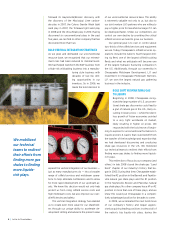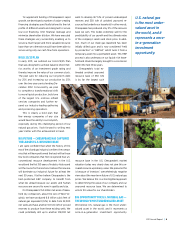Chesapeake Energy 2011 Annual Report Download - page 15
Download and view the complete annual report
Please find page 15 of the 2011 Chesapeake Energy annual report below. You can navigate through the pages in the report by either clicking on the pages listed below, or by using the keyword search tool below to find specific information within the annual report.
mercury and other airborne pollutants. Virtually
all these pollutants come from burning coal to
generate electricity and consuming gasoline
and diesel for transportation. Substituting natu-
ral gas for coal, gasoline and diesel is the only
actionable, aordable and scalable pathway to-
ward a cleaner environment.
You don’t read about it
very often, but since 1996 nat-
ural gas has already replaced
approximately 20% of the coal
burned in America to make
electricity. As a result, U.S. coal
consumption in 2012 will likely be the lowest in 16
years. Even more important, our air will be cleaner
and public health will be better as a result.
Now that we have begun this conversion
from coal to natural gas, we should make it a
national goal in the next few years to shut down
all coal-fired power plants not equipped with
state-of-the-art pollution control equipment. Be-
cause many coal-fired power plants are too old
and inecient to justify this financial investment,
it is quite reasonable to expect that we can re-
duce American coal consumption by another 25
to 33% during the next 10 years. Ironically, doing
so would reduce American carbon emissions be-
low the 2020 level that was sought by President
Obama’s 2009 cap-and-trade bill. That conten-
tious bill would have been enormously expensive
if implemented and today would be unnecessary
because of the rapidly increasing market share of
natural gas in the power generation market.
2011 Annual Report | 13
failure to stem the rising tide of foreign oil imports
during the past 40 years, I am confident a con-
certed eort to accelerate development of Amer-
ica’s shale gas and unconventional oil resources
can make our country fully independent of OPEC
oil within 10 years. We put a man on the moon in
10 years in the 1960s, so we should certainly be
able to use American natural gas and oil to re-
place OPEC oil imports within 10 years.
This independence from OPEC would have
enormously important psychological and com-
petitive benefits for our country, and for the first
time in 50 years we would be able to control our
energy destiny. Just as our country’s
economy benefited greatly from the
surge in American oil production
from 1920 to 1970 (1.2 million barrels
of oil per day to 9.6 million barrels
of oil per day), America could once
again lead the world in economic
growth if we achieved lower energy
costs and a significant reduction
in our oil import expense — all di-
rectly resulting from technological
advances applied to world-class unconventional
reservoirs right here in the U.S.
An added benefit of energy independence
would be fewer and less expensive foreign mili-
tary entanglements. During the past 10 years
we have suered more than 236,000 casualties
and spent more than $3 trillion dollars fighting
conflicts in Iraq and Afghanistan. It is quite pos-
sible these conflicts could have been avoided or
minimized if we had not been reliant upon OPEC
oil and had our oil imports not indirectly funded
terrorism against the U.S. during the past decade.
Developing America’s oil and natural gas re-
sources can provide our policymakers with the
opportunity to develop a new foreign policy that
capitalizes on America’s emerging ability to rely
on its own endowment of unconventional re-
sources to become energy independent from
OPEC. This could very well be one of the most
liberating events in our nation’s history. I look
forward to celebrating American energy indepen-
dence 10 years from now, just in time for the 50th
anniversary of the first OPEC oil embargo.
A CLEANER AMERICA, TOO
The development of America’s homegrown en-
ergy resources will not only save money, it will
improve our environment. Currently, the U.S. is
the world’s second-largest emitter of carbon di-
oxide and also a Top 10 emitter of particulates,
Imagine what
it would be like
to be able to
simply say “no”
to OPEC oil.
























